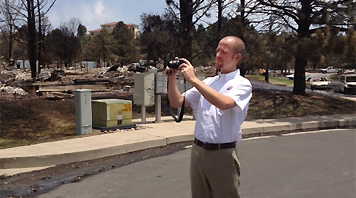|
RMIIA News Releases7951 E. Maplewood Avenue, Suite 110 Contact: Carole Walker, Executive Director Flash Flood Threat Rises—Are Homeowners Ready for the Downpour? August 5, 1999 – With another three inches of rain drenching the northern metro area yesterday and more wet weather in the forecast, homeowners need to do more than cross their fingers and carry an umbrella. Several areas are under a flood watch or flood warning today because of all the rain that has fallen this week. Colorado floods can cause significant damage, and not having flood insurance may prove costly to homeowners in the next flood's path. Many homeowners erroneously believe their homeowners insurance policy covers flood damage. It doesn't, and up to 75 percent of the buildings in the U.S. located in areas with a high risk of flooding are not covered by flood insurance. Flood insurance is available to both homeowners and renter whose communities participate in the federal government's National Flood Insurance Program (NFIP). Flood insurance can be purchased through any licensed property/casualty insurance professional who is writing flood insurance under arrangements with the Federal Insurance Administration. A 30-day waiting period is required between the time you purchase flood insurance and the time it goes into effect. In addition to making sure you're adequately insured, it's important to know what to do in case of flood. Rocky Mountain Insurance Information Association offers the following safety tips. BEFORE THE FLOOD Know the elevation of your property in relation to nearby bodies of water. If your home is not on high ground, know where high ground is and how to get there quickly. Keep apprised of weather conditions both where you are and upstream. Distant rain or snowmelt can cause a rampaging torrent headed in your direction in minutes. Be aware of flood watches and warnings. If a flood watch or warning has been issued, move your family (and belongings, if there is time) to high ground. In some cases, flood insurance will reimburse the costs you incur for moving and temporarily storing the contents of your home. Remember: Your homeowners insurance policy does not cover flood damage. If you decide to buy a flood insurance policy, which is the only type of policy that covers flood damage, consider insuring your home for 100 percent of replacement cost and buying insurance to cover the contents of your home, as well as the dwelling. DURING THE FLOOD
AFTER THE FLOOD
Although homeowners may not be able to prevent a flood, they can minimize a flood's devastating effects by being prepared. Adequate insurance will make your recovery that much easier. ### Rocky Mountain Insurance Information Association is a non-profit consumer information organization. Affiliated with the Insurance Information Institute, RMIIA has been serving consumers and the media since 1952. |
|
303-790-0216 • 800-355-9524 • Contact Us • Legal Notice, Disclaimer & Terms of Use
Home • About RMIIA • News Room • P&C Insurance Industry • Auto • Homeowners • Business • Catastrophes • Agent Resources • Events & Education • Brochures

